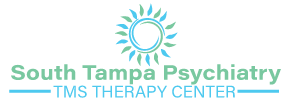Transcranial magnetic stimulation (TMS) is a practice you will find in many mental health treatment programs in FL. It is primarily used in the treatment of depression but, in the future, may play a role in pain management and neurological disorders, as well. What is it, and what TMS therapy side effects should you know about when considering treatment?
At South Tampa Psychiatry, we are proud to provide TMS therapy and a range of additional therapeutic options. We offer a wide array of treatment programs, which we tailor to each patient’s unique challenges. To learn about how TMS therapy can support your recovery, please contact South Tampa Psychiatry today at 866.273.5017.
The History of TMS
Theories about transcranial magnetic stimulation (TMS) began way back in the 1700s with the physician Luigi Galvani. Dr. Galvani was a researcher that studied the effects of electricity on the human body. His research laid the foundation for the field of electrophysiology.
In the 1800s, scientist Michael Faraday found that changing magnetic fields could produce an electrical current. Faraday’s discovery led to the development of electroconvulsive therapy, a treatment that was highly controversial and often overused in the treatment of mental illness.
Today, transcranial magnetic stimulation is a much safer and practical application that builds on the theories of Dr. Galvani.
What Is TMS?
Harvard Heath calls transcranial magnetic stimulation the best hope for resistant depression. It is a type of brain stimulation that works outside the body, so there is no cutting or anesthesia. In the treatment of depression, TMS delivers repetitive magnetic pulses to the brain and is often called rTMS.
TMS applies magnetic fields to specific areas of your brain that play a role in depression. As the magnetic fields begin to change, an electric current forms.
TMS has proven diagnostic and therapeutic benefits as a treatment for depression, the leading cause of disability in the U.S. Depression may also be co-occurring with other mental health disorders such as addiction. Programs that treat substance abuse will usually look to address underlying mental health issues like depression at the same time with tools such as TMS therapy. We also provide TMS therapy for a range of other conditions, including:
- Anxiety
- PTSD
- Bipolar disorder
- Substance abuse
To determine whether TMS therapy is the right treatment for your unique needs, please contact South Tampa Psychiatry today at 866.273.5017.
How Does TMS Work?
A magnetic pulse stimulates cells in the brain that help control mood and may be responsible for depression. It’s not clear why stimulating these cells provides relief, but some patients do report fewer symptoms and a general improvement in their mood.
Harvard reports that up to 60 percent of people who fail to respond to medication in the treatment of their depression do feel significant improvement with TMS therapy. A third of them see a full reversal of their depression symptoms, and the effect can last for months.
What to Expect During a Treatment
During your first session, the staff takes measurements that allow them to position the TMS coil on your head. The electromagnetic coil sits against your scalp up near the forehead to stimulate the correct brain cells.
The healthcare professional will administer brief initial pulses to measure your motor threshold, which can vary per person. With the proper measurements, the staff can personalize the TMS machine’s treatment settings.
Before the treatment, you will need to remove any jewelry and anything else magnetic. The machine makes a clicking noise, much like an MRI machine, which also works with magnetic fields, so you may also wear earplugs. As the treatment proceeds, you should feel no pain but may notice a tapping sensation from the coil.
TMS Side Effects
TMS therapy is well-tolerated by most, but it may have a few side effects, including:
- Headache
- Irritation at the stimulation site on the scalp
- Twitching on the face
- Feeling lightheaded
There are some more potentially dangerous TMS side effects, but they are rare. They could include mania or seizures, for example.
Get Treatment at South Tampa Psychiatry
If you have struggled with depression for any length of time, now is the time to get help. The key might be finding the right treatment facility, one that specializes in TMS therapy. South Tampa Psychiatry could be that place for you. Our expert team provides:
- Dual diagnosis treatment
- Mental health and addiction treatment
- Medication-assisted treatment
- TMS therapy for anxiety
They help those struggling with depression find the right treatment for their needs. South Tampa Psychiatry has specialty programs for professionals struggling with mental health disorders.
For more information about depression and TMS therapy or to get help for addiction, give us a call at 866.273.5017, or contact us online. We are here to help.







